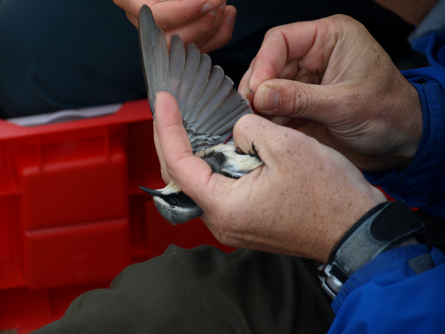AG Eikenaar

We combine studies on wild migrants with controlled experiments on long-term captive migrants to understand the endocrine regulation of migratory behaviour, and the physiological adaptations to and consequences of migration. In our studies we focus on stopovers, which are periods of recovery and fuel replenishment in between flight bouts. Field studies are conducted on Helgoland, a small island in the North Sea some 50km from the German coast, where many migrants make stopovers. In the lab, at the Institute of Avian Research (IfV), stopovers can be simulated by fasting the captive migrants and subsequently refeeding them.
Some of the questions we address are:
Is the decision to depart from a stopover site affected by corticosterone and/or ghrelin?
By fitting migrants with radio-transmitters we can effectively determine stopover duration and departure timing within the night on Helgoland and relate this to circulating hormone levels, while correcting for external and internal factors, such as weather conditions and body condition (fat score).
Are differences in migratory strategies reflected in birds’ physiology?
Physiological parameters that we study are the birds’ constitutive immune function, the always present first line of immune defense, and their oxidative state, the balance between damaging pro-oxidants and protective antioxidants. Helgoland supports a sedentary breeding population of common blackbirds and at the same time serves as a stopover site for migratory conspecifics. This means that we are able to compare the physiology of migrating and sedentary individuals at the same location during the same time period. At the species level, we compare the physiological state of migratory species facing different physiological challenges, such as total migration distance and the duration of individual flight bouts.
Can migrants recover at stopover from physiologically strenuous flights?
Migratory endurance flight is not just energetically, but also physiologically extremely demanding. Migratory flight is known to increase the production of pro-oxidants, leading to enhanced oxidative damage to lipids, proteins and DNA. Simultaneously, flight has a negative impact on constitutive immune defense. It thus seems plausible that migrants make stopovers not only to replenish their fuel stores, but also to recover physiologically. We approach this question by collecting longitudinal data on migrants’ oxidative and immunological state.

